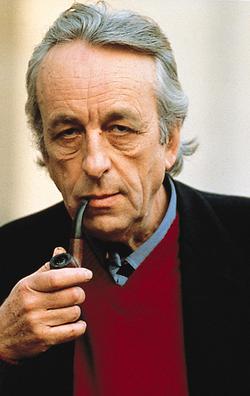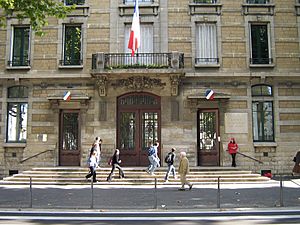Louis Althusser facts for kids
Quick facts for kids
Louis Althusser
|
|
|---|---|
 |
|
| Born |
Louis Pierre Althusser
16 October 1918 Birmendreïs, French Algeria
|
| Died | 22 October 1990 (aged 72) Paris, France
|
| Alma mater |
|
|
Notable work
|
|
| Spouse(s) | Hélène Rytmann (m. c. 1975; d. 1980) |
| Era | 20th-century philosophy |
| Region | Western philosophy |
| School | Western Marxism Structural Marxism Neo-Spinozism |
| Institutions | École Normale Supérieure |
| Notable students |
|
|
Main interests
|
|
|
Notable ideas
|
|
|
Influenced
|
|
Louis Pierre Althusser (16 October 1918 – 22 October 1990) was a French Marxist philosopher. He was born in Algeria and later became a Professor of Philosophy in Paris.
Althusser was a member of the French Communist Party. He often shared his ideas about Marxism, a way of thinking about society and economics. He wanted to protect the main ideas of Marxism from other influences. He is known as a structural Marxist, which means he looked at how different parts of society work together.
Louis Althusser faced many mental health challenges throughout his life. In 1980, a tragic event occurred involving his wife, Hélène Rytmann. Because of his mental state, he was hospitalized and could not stand trial. He did not do much academic work after this and passed away in 1990.
Contents
Who Was Louis Althusser?
Early Life and Education
Louis Althusser was born in 1918 in Birmendreïs, a town near Algiers in French Algeria. His family moved to Marseille, France, in 1930. He was a very good student and joined a scout group. Later, he moved to Lyon and was accepted into a famous school in Paris called the École Normale Supérieure (ENS).
During his studies, Althusser was influenced by Catholic teachers and even thought about becoming a monk. Some people believe his early interest in Catholicism shaped how he later understood the ideas of Karl Marx.
War Years and Captivity
In 1939, Althusser joined the French Army as World War II began. He was captured by the Germans in 1940 and spent five years in a prisoner-of-war camp in Germany. At first, he did hard labor, but later he worked in the camp's hospital. This allowed him to read a lot of philosophy and literature.
Althusser said that his time in the camp helped him understand the idea of Communism for the first time. He saw people working together and showing solidarity. However, this experience also affected his mental health, leading to periods of depression throughout his life.
Becoming a Professor and Communist Party Member
After the war, Althusser went back to the ENS in 1945. In 1946, he met Hélène Rytmann, who had been part of the French Resistance. They were together until 1980.
In 1948, Althusser became a tutor at the ENS, helping students prepare for their exams. He was very good at this and became well-known. He organized lectures and invited important French philosophers to speak. Many famous thinkers like Michel Foucault and Jacques Derrida were his students. He worked at the ENS for 35 years.
In October 1948, Althusser joined the French Communist Party. Many French thinkers joined the party after the war. He was active in the "Peace Movement" and tried to combine his Catholic beliefs with Communist ideas for a few years. He even started a study group at ENS focused on Marxist ideas.
Althusser's Main Ideas
Althusser's most famous books are For Marx (1965) and Reading Capital (1965). These books made him famous around the world. He believed that Karl Marx's ideas created a new way of understanding society.
Understanding Marx's Ideas
Althusser argued that Marx's writings changed over time. He said there was an "epistemological break" (a big shift in how he thought) in Marx's work around 1845. Before this, Marx's ideas were influenced by older philosophies. After this, Marx developed a truly new "science of history," called historical materialism.
Althusser believed that Marx's later work was different because it looked at how knowledge is "produced" rather than just "discovered." He thought that our understanding of the world comes from how we think about things, not just from seeing them directly.
Society as Practices
Althusser believed that society is made up of different "practices." These are like different ways people do things, such as:
- Economic practice: How people produce and exchange goods.
- Ideological practice: How people think about the world, their values, and beliefs.
- Politico-legal practice: How society is governed and its laws.
He argued that individuals are shaped by these practices. For example, a steelworker is part of economic practice, and a lawyer is part of politico-legal practice. These practices are all connected and depend on each other.
How Society Changes
Althusser used the idea of "overdetermination" to explain how society changes. This means that changes in society are not caused by just one thing. Instead, many different factors and "contradictions" (problems or conflicts) come together to create change.
He used the example of the Russian Revolution of 1917. Vladimir Lenin said that Russia was the "weakest link" because it had many different problems at the same time. This showed that a revolution happens when many different issues combine, not just one.
Althusser also said that while all practices are connected, economic practice is often the "structure in dominance." This means it has a major effect on other parts of society.
Ideology and How We See Ourselves
One of Althusser's most famous ideas is about "ideology" and "ideological state apparatuses" (ISAs). Ideology is the system of beliefs and values that shapes how we see the world and ourselves. ISAs are institutions like:
- The family
- The media
- Religious groups
- The education system (which Althusser thought was very important in capitalist societies)
Althusser believed that these ISAs teach us how to be "subjects." This means they teach us to see ourselves as independent, thinking individuals who are responsible for our actions. He used the example of a policeman shouting "Hey you there!" When someone turns around, they recognize themselves as the person being called, and in doing so, they become a "subject" in that moment.
He argued that we are always shaped by ideology, even before we are born. It's impossible to escape it. Our identities are formed by seeing ourselves reflected in these ideologies, much like how a baby recognizes itself in a mirror.
Later Ideas: Aleatory Materialism
In his later years, Althusser developed a new idea called "Aleatory materialism" or the "Philosophy of the Encounter." He thought that history is not always determined by strict laws. Instead, he emphasized the role of chance and unexpected events.
He believed that historical events are complex and unique, and that political action can make a difference at key moments. This idea suggests that things don't always happen in a planned way, and that unexpected encounters can change history.
Althusser's Impact
Althusser's ideas have had a lasting impact on philosophy and social sciences. Many of his students became important thinkers themselves, including Alain Badiou, Étienne Balibar, Jacques Rancière, and Michel Foucault.
His work continues to be studied and debated today. For example, his book On the Reproduction of Capitalism, which includes his famous essay on ISAs, was fully translated into English in 2014.
While his work is important, some people have also pointed out that Althusser sometimes wrote about philosophers he hadn't fully read. He also admitted to making up quotes in some of his early papers. These details show that even famous thinkers can have complex academic practices.
Images for kids
-
The main entrance to the École Normale Supérieure on Rue d'Ulm, where Althusser established himself as well-known intellectual
See also
 In Spanish: Louis Althusser para niños
In Spanish: Louis Althusser para niños
 | Selma Burke |
 | Pauline Powell Burns |
 | Frederick J. Brown |
 | Robert Blackburn |







